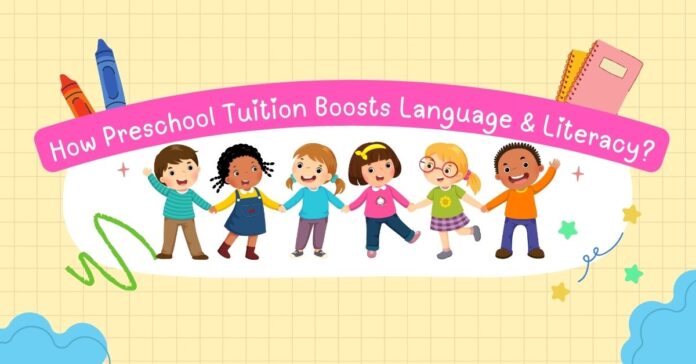The early years of a child’s life are critical for developing language and literacy skills. During this period, the brain is most receptive to learning sounds, vocabulary, and communication techniques. Enrolling your child in preschool tuition can significantly accelerate this development by providing structured guidance and a language-rich environment. With dedicated support and age-appropriate materials, children begin to understand and express themselves more effectively.
A Language-Rich Environment
One of the strongest benefits of preschool programs is the language-rich environment they create. Children are immersed in conversations, stories, songs, and rhymes that expose them to a broad vocabulary. Teachers engage with children constantly, encouraging them to listen and speak through structured and informal interactions.
-
Storytelling sessions help build narrative skills
-
Singing promotes pronunciation and rhythm
-
Daily discussions improve vocabulary and listening skills
-
Group activities encourage peer-to-peer conversations
Such exposure allows children to absorb language naturally, much like how they learned their mother tongue.
Learning Through Play
Preschool tuition isn’t about rote learning. Instead, it uses play as a vehicle to promote communication. Role-playing games, puppet shows, and interactive storytelling allow children to use new words in context. These activities make language learning feel fun and effortless.
-
Role play builds dialogue skills
-
Puppetry enhances expressive vocabulary
-
Games reinforce naming and describing objects
-
Creative play fosters spontaneous speech
By associating words with real experiences, children gain a deeper understanding of their use and meaning.
Early Exposure to Phonics and Letters
Preschool programs introduce phonics—the sounds that letters make—which lays the groundwork for reading. Children learn how to connect spoken sounds to written symbols, which is the first step toward literacy. This early exposure helps them decode words independently as they grow older.
-
Letter recognition using songs and visuals
-
Sound games to identify initial letters
-
Tracing and drawing to reinforce shapes of letters
-
Rhyming words for pattern recognition
These activities ensure children develop a solid foundation in phonological awareness.
Encouraging Communication Skills
Beyond vocabulary, children also learn how to use language to express needs, share stories, and interact socially. Preschool classrooms are built around communication, helping shy children come out of their shells and active ones learn to listen.
-
Show and Tell boosts confidence in speaking
-
Group discussions teach turn-taking
-
Circle time enhances active listening
-
Question and answer sessions develop comprehension
This nurtures both receptive (listening) and expressive (speaking) skills in a balanced way.
Vocabulary Expansion Through Exploration
Preschool tuition gives children access to materials and topics they may not encounter at home. Themes like animals, seasons, or transportation introduce a wide range of new words. These topic-based activities ensure vocabulary is taught in context.
-
Picture books that feature new themes
-
Visual aids and charts for word association
-
Field trips and theme weeks for experiential learning
-
Art projects that spark conversation and description
As children encounter new themes, their vocabulary naturally grows more diverse.
Boosting Early Reading Habits
Regular story sessions, access to books, and shared reading moments encourage a love for reading early on. Preschool classrooms often include cozy reading corners and encourage reading aloud, both of which are critical in building early literacy habits.
-
Teachers model fluent reading
-
Children are encouraged to handle books independently
-
Storytime rituals instill a sense of enjoyment
-
Book-based activities tie reading to creativity
Reading becomes not just a skill, but a pleasurable habit formed during the preschool years.
Supporting Individual Learning Paces
Every child learns differently, and preschool tuition ensures that language and literacy development is tailored to individual needs. Small group settings and personalized instruction help educators identify and support children who need extra help or additional challenges.
-
Diagnostic tools to assess language skills
-
Progress tracking to personalize goals
-
One-on-one interactions for focused support
-
Flexibility to cater to different learning styles
This approach ensures no child is left behind, and each one builds confidence in their abilities.
Parental Involvement and Reinforcement
Parents are key partners in reinforcing what children learn in preschool. Many programs offer updates, suggestions, and resources for parents to use at home. This consistent reinforcement creates a seamless language-learning experience across home and school.
-
Home reading logs
-
Vocabulary practice sheets
-
Daily conversation prompts
-
Parent-teacher communication channels
This bridge between classroom and home helps language skills flourish consistently.
Conclusion
In the early stages of childhood, building strong language and literacy skills is foundational for future academic success. Through structured lessons, playful learning, and constant communication, preschool tuition provides the ideal environment to nurture these essential abilities. From phonics to storytelling and peer interaction, the benefits go far beyond the classroom walls. Investing in the right support early on sets the stage for a lifetime of confident communication and effective reading skills.
